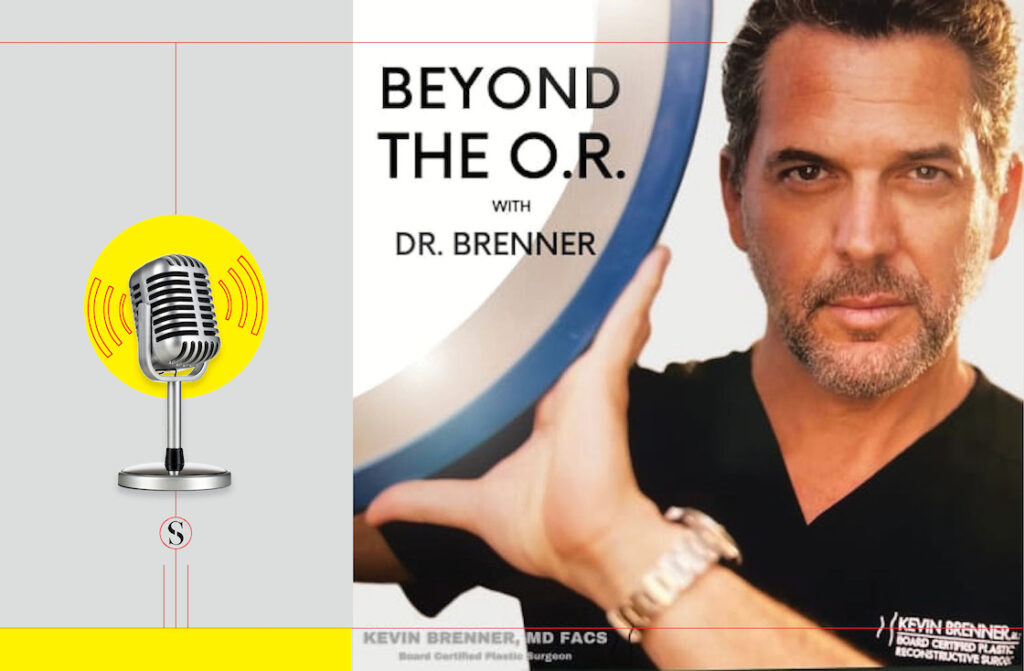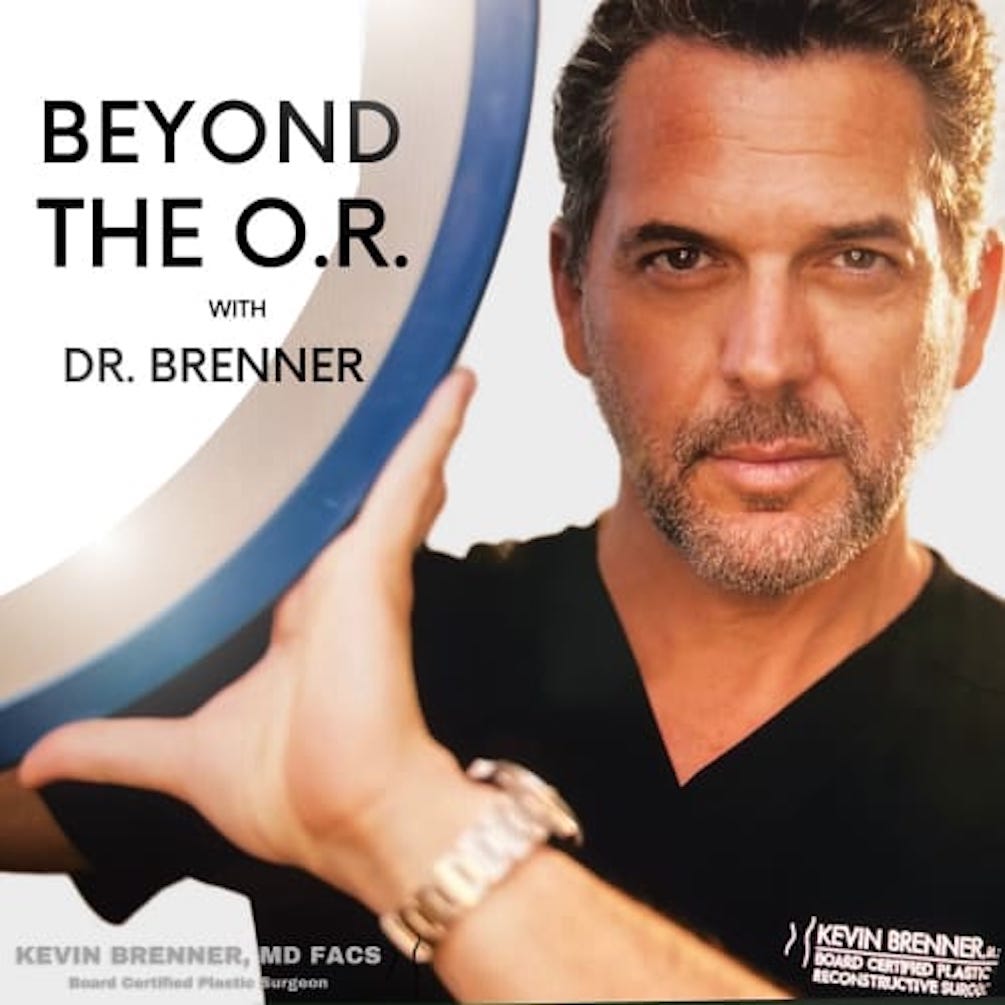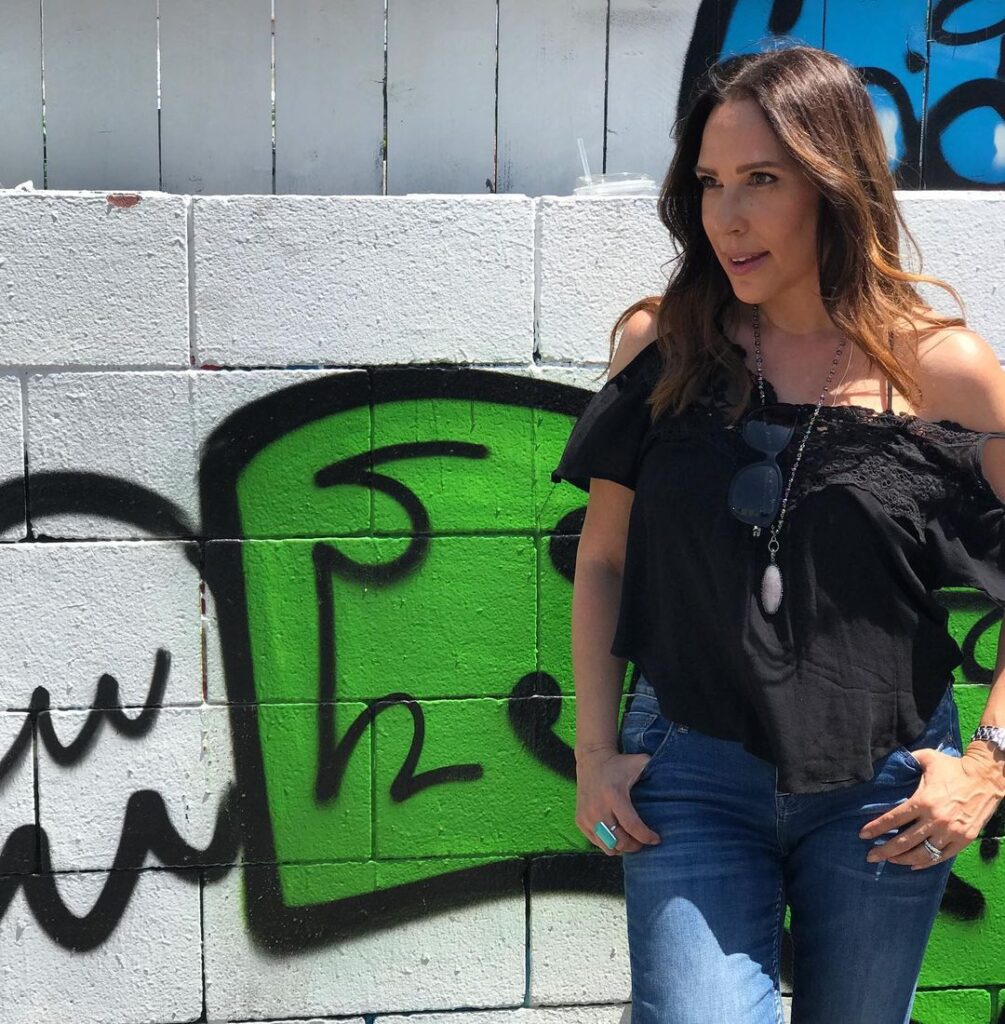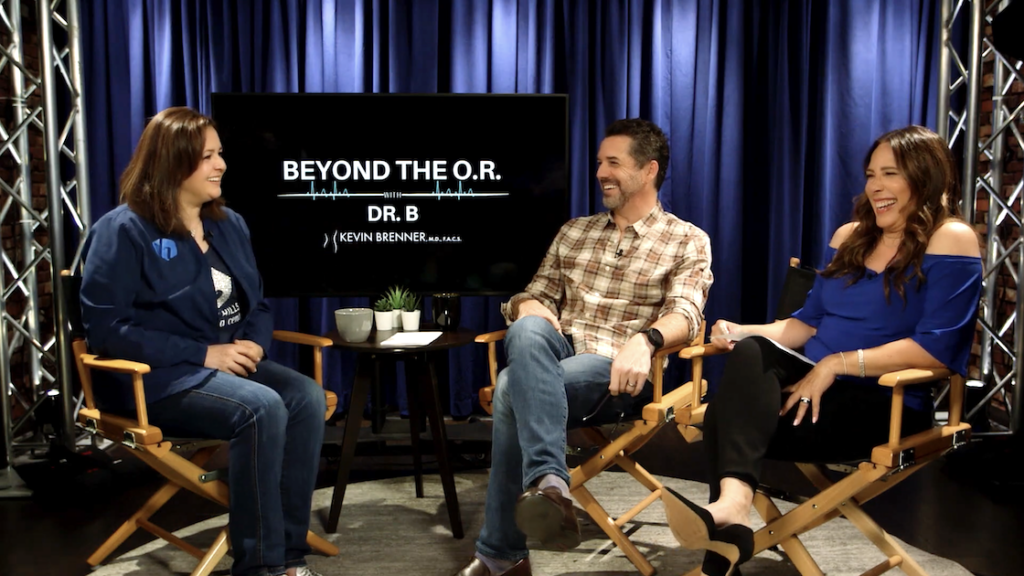Twelve minutes into the inaugural episode of Dr. Kevin Brenner’s new podcast, premiered Wednesday, you’ll have a solid feel for the man whose namesake plastic surgery practice sits at 465 N Roxbury Drive, in Beverly Hills, California.
Creative. Honest. Dependable. Trustworthy.
Pressed, these are the words the doctor says probably best describe him.

“I think—and I think the people closest to me think—that I’m very real,” he says.
“I mean there’s a lot of nonsense in my business, especially in Beverly Hills.
“There’s just a lot of craziness and I really try to keep it real.”
For 24 minutes Wednesday, real meant speaking of some of the profession’s highlights and history, and its shortcomings and conflicts of interests, but mostly, an informative, enjoyable exchange between surgeon and patient turned podcast co host.
If Beverly Hills is the heart of plastic surgery, North Roxbury Drive and North Camden Drive are its left and right ventricles; Wilshire Boulevard and Rodeo Drive its adjacent atriums.
More of the world’s most renowned plastic surgeons practice here, in this sliver of mostly vertical real estate, than anywhere else on Earth.
Here, when a plastic surgeon steps up to the mic—or stands behind a professional cause—the surgical community, classically conflicted, slowly moves closer to consensus.
Brenner’s offices and on-site surgical suites overlook the city from eight stories up.
But today, out of surgical scrubs and dressed in blue jeans and black and plaid button ups, he’s in studio, off La Brea in West Hollywood.
His podcast promises a platform for more than his voice alone.

“On ‘Beyond The O.R.,’ Dr B will take you beyond plastic surgery,” the show’s promotional audio says.
“Listen as he talks with doctors, friends, people who have inspired him along the way, and patients whose lives he’s changed.”
One of his most important causes of late is somewhat central to the episodes of his podcast thus far aired: Breast implant illness.
Dr. Kevin Brenner—you’ll have learned so far in a candid first convo with the female co host who convinced him to launch the podcast—is a Wordle-obsessed Virgo once set on a career in pediatrics.
But the power of surgery convinced him instead to enter plastics.
While on a training rotation, Dr. Brenner noticed it was the surgeons who were “it,” and, being both technical and creative, he decided he was better suited for plastic surgery.
Dr. Brenner’s demeanor comes off as down-to-earth, widely studied or experienced, compassionate, and even funny.
(He lands three off-the-cuff one-liners, in a subsequent episode with Emmy-award winning comedy and SNL writer Hugh Fink, of whom he’s a huge fan and friend.)
For eight of the more than 20 years he has been in practice, billed as a “master of natural results,” he has listened to and cared for a growing number of patients who have come to experience—or exist with—a constellation of problems stemming from their breast implants.
His own cohost is one of them.
His co-host, actress, producer, and writer Elizabeth Morales, was a patient of his whose life she says he changed forever.
“I suffered from [breast implant illness] and I was extremely sick…. I lost participation in my son’s life for almost two years…and it was killing me.”
Elizabeth Morales, patient of Dr. Kevin Brenner’s, and co-host of “Beyond The O.R.” Morales says she and her husband thank Dr. Kevin Brenner for a surgery that saved her life.
“I suffered from BII and I was extremely sick,” Morales shares in the opening episode.
“And when I came into your office, I mean, I have pictures. Like my skin was gray, my eyes are dark, I mean I was really sick. I couldn’t get out of bed at times. I couldn’t walk because I had this burning sensation at the bottom of my feet all the time, I couldn’t move my hands in the morning [because] they would hurt so badly.
“The day after surgery, I am… my color is different, my eyes are different. And I’m a different human being. Like I couldn’t…. I [had] lost participation in my son’s life for almost two years, because I just…. And it was killing me.”

Witnessing experiences like Morales’s has changed Dr. Brenner, too, he says.
“If you had asked me eight years ago [about whether breast implant illness exists], before I got really knee-deep in this, I don’t know that I would have the same answer. Because I see it every day. And patients are getting better, and feeling better, and just their lives really are changing,” he says.
“I mean, plastic surgery is life-altering in many respects no matter what you do, but this is like—there’s a difference between building self-confidence, and changing your life so that you can actually get out of bed in the morning, and function, and take care of your family, and go to work and all that. You know, there’s some people that have been really sick, and it was really just killing their life.”
These threads carry through to the next episode, also out Wednesday.
Here, the board-certified plastic surgeon shares that conflicts of interest have probably prevented forward progress in understanding the ails occasionally caused by implants.
“Most patients do fine with breast implants, but the ones that don’t, are really sick,” says Dr. Brenner, speaking now with guest and favored colleague Dr. Shirin Towfigh, a Beverly Hills hernia repair specialist.
“Hernias are a very sexy topic, not like plastic surgery.”
Dr. Shirin Towfigh, Beverly Hills hernia specialist, jokingly, on “Beyond The O.R.” with Dr. Kevin Brenner and co-host actress/producer, Elizabeth Morales

“Hernias are a very sexy topic, not like plastic surgery,” she says, jokingly.
The two quickly converge on the subject of patient illnesses resulting from implants.
For Dr. Towfigh, it’s implanted surgical meshes, for Dr. Brenner, breast implants.
The potential problems from both devices are itchingly similar.
“There’s also a lot of conflict of interest, and the issue underlying all of this is similar for [surgical hernia] mesh as it is for breast implants in that it’s big money,” Dr. Brenner tells Dr. Towfigh.
“We’re horrible,” she says, referencing the state of understanding and acknowledgement, or lack thereof, by her industry of the various illnesses that she’s seen affect patients given mesh implants as part of their hernia repair.
“At least you have a term [for it], ‘breast implant illness.’ I just published a paper for the first time, using the term ‘mesh implant illness,’ never been used before.
“At least you have some papers that actually addressed it,” she continues. “Now, they looked at it and said it ‘doesn’t exist,’ but we have zero papers. I’m one of the few that’s actually saying, ‘Here’s my patients, here’s what’s happening to them.’ It’s zero.”
Dr. Brenner clarifies that until now, BII has been a patient-driven phenomenon, but that the tide has finally turned.
“The tide has shifted and there’s so much talk about it, that our societies are no longer able to ignore it, and they’re studying it, as they should,” Dr. Brenner says.
“There’s a lot of mesh and a lot of breast implants that go into people every year. And it’s big money for these companies. And so if that suddenly turned off—not that it’s going to—that’s a lot of ad dollars, that’s a lot of money both to companies, and to [surgical] societies. Our Societies, a lot of meetings are funded by breast implant companies.”
Beyond being lecture-like in the way that actionable information can be distilled into ½-hour segments, podcasts also have a way of peering into the nature of a host, what with the lack of everything but audio.
(The show is also available on YouTube: approximately 17 percent of podcasters record also in video format and 72 percent of listeners hear audio-only.)
There’s a saying–and a book with the title—that “Everybody Has a Podcast (Except You).”
For most, the host’s voice precedes listeners’ knowledge of their physical form; of who they are as a person and a professional.
For plastic surgeons—whose photos and likenesses decorate their websites and are often central to their branding—the sequence of discovery is typically reversed.
It’s harder to get to know more than a surgeon’s face from social media, or perhaps a minute long soundbite, and a podcast peers into who they are more so than most other mediums.
Podcasts are increasingly popular in plastic surgery.
Brenner’s promises to be different—is different—in that he’s opening the platform for listeners to hear from other professionals and patients as much as to hear from himself.
Afterall, when else will you hear your surgeon speak for hours on end?
That’s an important dynamic for a potential patient to experience.
And it plays a role in the professional community as well, with plastic surgeons, according to studies, often turning to other surgeon’s social media, YouTube channels, and podcasts, to get a glimpse of their surgical approach to various procedures.
And when a prolific plastic surgeon in private practice speaks their mind and strikes a chord with a plastic surgeon in Duke, Columbia, UCLA—or a stones’ throw across the street in Beverly Hills—real change happens. For patients.
“I’ve taken care of patients who are homeless, up to billionaires, and everything in between,” he says.
It’s these patients and professionals that “Beyond The O.R. With Dr. Kevin Brenner” gives a welcome voice to.
